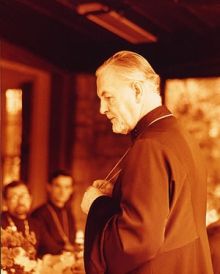Source: St. Michael Orthodox Church
 Several years ago a French publishing house asked a cross-section of famous people –writers, philosophers, artists– to contribute to a small book, entitled What I Believe. … Their responses were profoundly different from one another, and each essay is fascinating to read. One and the same faith has become new and personal when mediated by personal experience, personal understanding, yet it never ceases to be one faith shared in common.
Several years ago a French publishing house asked a cross-section of famous people –writers, philosophers, artists– to contribute to a small book, entitled What I Believe. … Their responses were profoundly different from one another, and each essay is fascinating to read. One and the same faith has become new and personal when mediated by personal experience, personal understanding, yet it never ceases to be one faith shared in common.
[P]eople today often speak about religion and Christianity primarily on an impersonal, objective, dogmatic level. Not only religion’s opponents, but even believers are accustomed to discussing how and what Christianity teaches, how and what believers affirm. Yet faith, in its very nature and essence, is something deeply personal, and therefore it is only really alive when seen in the context of personality and personal experience. Only when a particular teaching of the Church –or, as we say, a dogma, an affirmation of some particular truth– becomes my faith and my experience, and therefore the main content of my life, does this faith come alive. If one reflects on faith and thinks about how it passes from one person to another, it becomes obvious that what really convinces, inspires and converts is personal experience. This is especially important in Christianity, because, in its essence, Christian faith is a personal encounter with Christ, an acceptance not of this or that teaching or dogma about Christ, but of Christ Himself. In other terms, Christianity is extremely personal. … Christ addresses Himself to each person, so that each faith, the faith of each, while being rooted in the common faith, is at the same time unique. This reminder is particularly important today, because opponents of faith all attempt to turn the battle with faith and religion into a scientific debate in order to confuse believers with scientific arguments, as if the discussion were about an objectively knowable phenomenon of nature.
As long as the discussion remains on this scientific level–or rather pseudo-scientific level-then everything Christians affirm as the content of their faith is virtually unprovable. For believers, however, Christianity needs no proofs because they have experienced it; they know first-hand the reality of this experience in the same way that a person knows within himself the reality of love, wonder, pity, compassion. And this means that while faith is not subject to proof, it can be described and recounted. The Gospel itself is essentially an account of faith and not a scientific summary of facts. It is an account transmitted by those who saw and heard Christ, who believed in Him, and who came to love Him to the point where He became their very life. It is the account of their experience, which is why the Gospel forever remains alive and why it strikes to the heart, while philosophical and theological treatises often leave mind and heart cold.
Fr. Alexander Schmemann, Celebration of Faith (Sermons, Vol. 1: “I Believe”), pp. 15-17
















